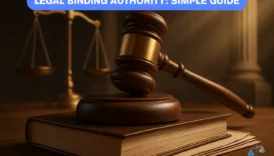What Is a Declaratory Relief?

What Is Declaratory Relief? (Simple Definition)
So, declaratory relief — yeah, it sounds fancy, but it’s actually pretty simple once you get the idea. It’s when you go to court not because someone already did something wrong, but because you want the judge to tell you what’s what before things get messy. You’re basically saying, “Hey, we’re not sure what this contract or law really means, can you clear it up for us?” There’s no demand for money, no punishment, just… clarity. And honestly, that’s kind of refreshing in the legal world.
What makes declaratory relief special is that it’s preventive — not reactive. You’re not trying to win a fight, you’re trying to stop one from even starting. The court’s job here is to declare, not to enforce. It’s a bit like asking for directions before you take the wrong exit on the highway. And once the court says, “Okay, here’s how this law applies to you,” that’s it — it’s legally binding. No one gets fined, but everyone knows where they stand.
The whole concept actually goes way back. Old English courts — the ones that dealt with fairness and equity — they were already using this kind of remedy centuries ago. Later on, the U.S. decided to make it official with something called the Declaratory Judgment Act of 1934. That law basically opened the door for people to say, “I don’t want to wait for trouble; I just want to know if what I’m doing is legal.” And honestly, that makes a lot of sense.
Why People Even Bother With It
Here’s the thing — uncertainty costs money, right? It causes stress, delays, arguments… and lawyers (trust me) make a fortune off of that. Declaratory relief flips that script. Say you’re running a business, and you’re not sure if your new contract clause breaks a regulation. You could wait to get sued, or you could just go to court and ask for a declaratory judgment. It’s like getting legal GPS — “turn left here, don’t go that way.”
Same with insurance companies. They love this tool. When there’s a gray area about what their policy actually covers, they’ll file for declaratory relief. That way, they get a clear answer before anyone drags them into a bigger lawsuit. It saves everyone time, money, and a whole lot of headaches.
At the end of the day, declaratory relief isn’t about winning or losing — it’s about understanding. It’s a quiet kind of justice. You don’t walk out with a check, but you walk out knowing exactly where you stand. And in law, that’s sometimes all you really need.
How Declaratory Relief Actually Works (and Why It’s Super Useful)
Alright, let’s get real for a second — declaratory relief isn’t just some dusty courtroom phrase. It’s one of those legal tools that quietly saves a ton of people from future chaos. The idea is simple: instead of waiting for a lawsuit to explode, you go to court early and say, “Look, before anyone gets mad, can we just figure out what the rules are?”
It’s especially common in three big areas — insurance, contracts, and constitutional law. Like, insurance companies do this all the time. Say they’re not sure if a certain claim — maybe something weird like environmental cleanup costs — is covered under a policy. They’ll file for declaratory relief to have a judge decide what the policy actually means. Once the judge gives that declaration, everyone knows what’s what, and they can move forward without a shouting match.
Businesses use it too. Imagine two companies arguing over what a partnership clause really says. One side might say, “We’re responsible for marketing only,” and the other insists, “No, it’s everything.” Before that turns into a six-figure lawsuit, they can file a declaratory judgment action and just ask the court to interpret the contract. It’s not about winning or losing — it’s about clarity.
And then there’s the bigger stuff — constitutional challenges. When someone thinks a new law violates their rights, they don’t have to wait to get arrested or fined. They can file for declaratory relief and ask the court to say, “Yep, this law’s unconstitutional,” or “Nope, it’s fine.” It’s a way to prevent harm before it happens. Honestly, that’s what makes it kind of brilliant — it’s proactive, not reactive.
Okay, But How’s It Different From Other Legal Remedies?
Let’s skip the spreadsheet vibes and just talk this through:
If you’re asking for damages, that means someone already did something wrong — you got hurt, you lost money, whatever — and now you want the court to make them pay.
If you’re asking for an injunction, that’s when you’re saying, “Judge, please make them stop doing this thing right now.” It’s more urgent, more active — like pulling the brakes on an ongoing issue.
But declaratory relief? That one’s chill. It’s the court saying, “Here’s what the law means for you,” without forcing anyone to move or pay. It’s the calm before the storm — or better yet, it’s the thing that stops the storm from happening at all.
So, in short:
- Damages = “You hurt me, now pay up.”
- Injunction = “Stop what you’re doing immediately.”
- Declaratory relief = “Let’s just figure out who’s right before this gets messy.”
Way less formal, way more practical. And most of the time, it saves everyone from way bigger headaches later.
A Few Real-Life Examples (Because Theory Is Boring)
Insurance Example:
So picture this — an insurance company gets this wildfire claim and honestly, they’re not even sure if it falls under their “natural disaster” policy. They could spend months going back and forth with lawyers, or — the smarter move — they just ask the court to step in and say, “Alright, what does this clause really mean?” It saves everyone a whole lot of headache and paper, trust me.
Business Example:
Two startup partners, good friends at first, suddenly realize they might not agree on who owns the idea they built together. One of them starts to worry — “Hey, if we get investors, this could get ugly.” So before it turns into one of those messy co-founder breakups, they file for declaratory relief and let the court say who actually holds the rights. No drama, no bad press — just clarity.
Civil Rights Example:
Now take something bigger — a nonprofit looks at this brand-new state law and goes, “Uh, this feels kinda sketchy… doesn’t it mess with free speech?” Instead of waiting for someone to get fined or shut down, they go to court first. They’re like, “Can we get a ruling on whether this thing even passes constitutional smell test?” That’s declaratory relief doing what it does best — stopping trouble before it starts.
In all these cases, no one’s been harmed yet. Declaratory relief steps in before things spiral. It’s the legal world’s way of saying, “Let’s take a breath and figure this out before the storm hits.”
Why Declaratory Relief Still Matters Today
You’d think by now, with all the fancy tech and instant access to information, people wouldn’t need courts to explain what the law means anymore. But honestly? The opposite’s true. These days, laws and contracts are getting more complicated than ever — especially with things like data privacy, AI regulations, and online business stuff. That’s where declaratory relief quietly saves the day. It’s still that go-to move for anyone who just wants a straight answer before taking a risky step.
Take tech companies, for instance. They’ll build some new platform or data feature and realize, “Hmm, are we even allowed to collect this kind of info under these new privacy rules?” Instead of guessing (and possibly ending up on the front page for the wrong reasons), they file for declaratory relief. A judge steps in and says, “Here’s what the law actually allows.” Boom — clarity before catastrophe.
Even outside of tech, it’s becoming a smart defensive play. Governments use it to test new policies, NGOs use it to challenge vague laws, and businesses use it to double-check the meaning of contracts that could cost them millions if interpreted wrong. It’s like the legal version of a pre-flight checklist — better to find out what’s off before you take off.
Some Critics, Sure — But It’s Hard to Argue Against Clarity
Now, not everyone’s in love with it. Some judges say declaratory suits just clog the system with “what if” scenarios. You’ll hear lawyers complain too, like, “People are filing declaratory actions just to stall time or scare the other side.” And yeah, sometimes that happens. But let’s be honest — every legal tool can be abused if you push it far enough. That doesn’t mean the tool itself is bad; it just means you need to know how and when to use it.
The bigger picture here is that declaratory relief keeps the legal system forward-thinking. Instead of reacting to chaos, it encourages people to ask questions early — to clarify, not just complain. And that’s a shift most courts quietly appreciate, even if they don’t always say it out loud.
Wrapping It Up
You know, at the end of the day, declaratory relief really comes down to one thing — peace of mind. That’s it. It’s just a way of saying, “Let’s sort this out now before someone ends up hurt, broke, or knee-deep in paperwork.” It’s not about winning, it’s not about payback; it’s about knowing where everyone stands so life can move on.
And honestly, with laws changing so fast these days — faster than half the apps on your phone update — having that kind of clarity? It’s not just nice to have; it’s survival. Whether you’re a small business owner trying to stay compliant, a tech company pushing new ground, or just a person wanting to know your rights, declaratory relief gives you something rare in the legal world: a straight answer before the storm.
“Law gets messy. Declaratory relief doesn’t fix the mess — it helps you avoid it.”
Author Note
Hey, before we wrap this up completely, let me just say this — everything you’ve read here is for general understanding, not legal advice. I’m not your lawyer (and you probably don’t want free legal advice from the internet anyway). Laws can vary like crazy depending on where you are, and even small procedural details can change how declaratory relief actually works in your jurisdiction.
If you’re dealing with a real case — like, you’re actually about to file something — seriously, talk to a licensed attorney who knows your state or country’s laws. They’ll help you figure out whether declaratory relief is even the right move for your situation.
Most of what I’ve talked about here comes from the Declaratory Judgment Act (28 U.S.C. § 2201–2202) in the U.S., along with old common-law principles that courts still rely on. The whole point was to explain it in plain English — because let’s be honest, legal language can make even the simplest thing sound like rocket science.
So yeah, take this article as a friendly breakdown of a pretty neat legal concept — one that keeps the system a little more proactive and a lot less chaotic.
FAQ Section
So… what does declaratory relief really mean?
Alright, in plain talk — it’s when you ask a court to clarify something before it turns into a full-blown mess. No suing for cash, no punishment, nothing dramatic. You’re basically saying, “Hey judge, can we just settle what this contract or rule means?” It’s like getting the rules straight before the game even starts.
When would someone actually use it?
Honestly, anytime you’re stuck in that gray zone — like a business contract that could mean two things, or a law that feels a bit off. People use it when they want peace of mind before things go sideways. If you’re already in a fight, it’s probably too late. Declaratory relief works best as an early move, not a last resort.
Does the court have to give you one if you ask?
Nope, not at all. The court can just say, “Nah, this isn’t a real conflict yet.” Judges don’t like to play guessing games — they only step in if there’s a real issue, not just a “what if.” So if it’s too hypothetical or feels like a test case, they’ll probably toss it.
How’s it different from a normal lawsuit?
Think of it like this: a regular lawsuit ends with someone winning or losing — maybe even paying damages. But declaratory relief? It’s more like the referee explaining the rules before the game starts. Nobody gets paid, nobody’s punished — you just walk out knowing where you stand.
Why do lawyers keep calling it a time-saver?
Honestly… because it kind of is. Think about it — most lawsuits drag on forever, and the bills pile up faster than the progress. With declaratory relief, you just go in early, ask for clarity, and get an answer while everyone else is still drafting angry emails. It doesn’t solve everything, sure, but it cuts through a lot of noise before things turn ugly.






